- Student
- Student
- News
- Business School
- Doctoral School
- International Dean’s Office
- International Cooperation Office
- Academic Career Office
- Academic Sports Association
- Library
- Student Groups
- Internships
- Electronic Examination Center
- Scholarship office
- Finance Department
- Your Stay in Poland
- Academic Schedule
- The Centre for People with Special Needs
- Alumni and Students Association
- Personal Student Profile
- Support Zone
- Virtual University
- Contact
- Individual Study Plan
- Admissions
- Admissions
- Research
- University
- Erasmus+
Otwórz/zamknij menu dostępności przy pomocy klawisza Enter
A-
Decrease font size
A+
Increase font size
Increase cursor size
Decrease cursor size
Sign language translation
Change contrast
Reset settings
Monographs
-
by Paulina Polko
Based on a review of conceptual and empirical work on security theory, including Securitization Theory (ST), Riskification Theory (RT), and Just Securitization Theory (JST), the analysis of securitization processes in Polish political discourse and their impact on political practice is presented. Paulina Polko proposes a theoretical and practical approach that allows readers to understand why and how selected challenges (risk and threats) are presented as existential threats become security issues, which leads to the acceptance of the use of extraordinary measures to implement practical solutions to fight or manage this challenges, risks, and threats.
-

by Łukasz Sułkowski, Zdzisława Dacko-Pikiewicz, Katarzyna Szczepańska-Woszczyna
This book invites readers on an intellectual journey where the great minds of philosophy intersect with contemporary organizational challenges.
With classical and modern philosophical thought as its backbone, Philosophy and Management: Great Minds and Organizational Ideas demonstrates that the most renowned thinkers in human history, such as Aristotle, Confucius and Nietzsche, provide timeless wisdom for navigating the complexity of today’s business environments. Combining theoretical insights with practical applications, this book presents philosophical frameworks as robust foundations for decision-making, conflict resolution and leadership strategies. It explores crucial areas such as strategic management, human resources, ethics, corporate governance and innovation, challenging readers to explore management from a reflective and ethical perspective, and shows how philosophy equips leaders to build resilient and morally responsible organizations, which are essential in an age dominated by technological advancement and rapid societal changes.
-
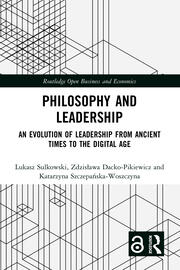
by Łukasz Sułkowski, Zdzisława Dacko-Pikiewicz, Katarzyna Szczepańska-Woszczyna
Philosophy and Leadership is an ambitious exploration of leadership's philosophical underpinnings from antiquity to the AI-driven future. The book journeys through history, gleaning insights from eminent philosophers and contextualizing their teachings to leadership.
The book's foundational premise lies in the symbiosis of philosophy and leadership. Philosophy provides the "why" that drives the practices and decisions in leadership. This intricate connection is unfolded from the teachings of Confucius on virtue and ethics to the contemporary dialogues of Judith Butler on leadership identity. The book also delves into the evolution of leadership concepts through various eras—medieval times highlighting religious and scholastic perspectives, the Renaissance juxtaposing Machiavellian pragmatism with More's utopian ideals, and the Enlightenment era underscoring the importance of duty, skepticism, and rationality. An exciting aspect of the narrative is the amalgamation of evolution and leadership. By drawing parallels between Darwin's natural selection and leadership dynamics or Bergson's vitalism and intuitive leadership, the authors present a merger of biological evolution with leadership's ever-evolving paradigms. Finally, the concluding chapters reside in envisioning the future and reflect upon the impending synergy between AI and leadership. They emphasize the importance of amalgamating philosophical wisdom with the promises and challenges brought about by AI.
-
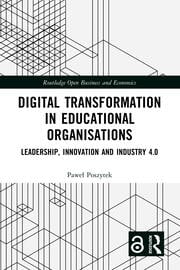
by Paweł Poszytek
Technological transformation should lead to enhance people’s potential and the development of their cognitive and social competences, especially those connected with effective communication on different levels. The COVID-19 pandemic has intensified all these processes and, for better resilience and effectiveness at work, it requires now different sets of competences. This book gives direct insight into changes that take place in education in the context of an unprecedented and rapid technological advancement, which requires the reorientation of goals and functions based on innovative, adaptive and flexible solutions – in most cases driven by individual leadership. It describes the way to reach this reorientation and shows through thorough research how educational leaders position themselves on this way in this fast-changing ecosystem. Exploring how educational leaders manage the challenges of digital transformation, using European collaborative projects, this research volume discusses how this process impacts the effectiveness and sustainability of organizational activities. Establishing a model for assessing digital transformation in educational organizations and evaluating the effectiveness of their leaders, it will be of value to researchers, academics, practitioners, and advanced students in the fields of leadership, organizational change, management of technology and innovation, and those interested in the development of education and the utilization of digitalization.
-

by Ewa Łaźniewska, Joanna Kurowska-Pysz, Tomasz Górecki, Khrystyna Prytula, Klaudia Plac
This book addresses the complex socioeconomic situation in the Polish-Ukrainian borderland, in the context of the labour market, following Russia’s invasion of Ukraine.
It analyses and assesses the measures which influence the process of Ukrainian war refugees’ adaptation to the Polish labour market, surveying the engagement of local actors, such as employers, labour market institutions and nongovernmental organisations. It examines the impact of the refugee crisis on this market, as well as mobilisation of various groups of actors in order to support this specific group of migrants in adapting to life in Poland. The authors argue that this phenomenon of the migration of war refugees confirms the thesis that political instability can be a factor in pushing people abroad as equally important as inequalities in prosperity.
The book identifies the characteristic features of the stream of war refugees from Ukraine as a category of cross-border flows. Before the Russian attack, the influx of Ukrainians to Poland was due mainly to economic pressures, whereas, after the outbreak of war, Ukrainians’ motivation to cross the border with Poland as well as the structure of this migration stream have radically changed. The book offers in-depth insight into the development of borderland regions, and especially the cross-border labour market as a specific element of the borderland economic ecosystem. It highlights the positive outcomes of the migration crisis, which will serve as examples of best practice for other regions in Europe.
-
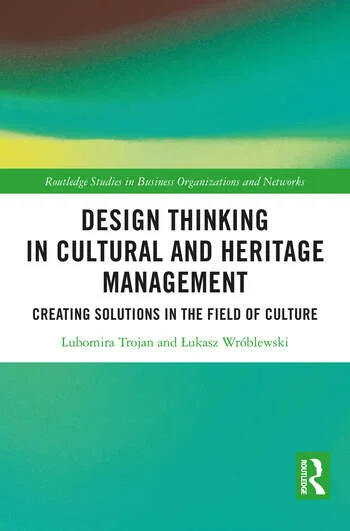
by Lubomira Trojan, Łukasz Wróblewski
The ability to discover and respond to societal needs in the field of culture requires an integrated, interdisciplinary, and cross-sectoral approach. Such a holistic view is offered by the design thinking method, which has been extracted from the field of design and could be applied also in the sphere of culture. Interdisciplinarity and consideration of users' needs are characteristics of contemporary design and can be a significant support when faced with the challenges of cultural heritage management. The abovementioned factors act as the premise behind undertaking an analysis of the possibility of adapting the design thinking method to the management of intangible cultural heritage, and to develop a model of the design thinking process for this area. This research volume is the first comprehensive study of the application of the design thinking method to cultural management, especially management of the intangible cultural heritage. It asserts that design thinking can bring numerous benefits to organizations involved in the management of intangible cultural heritage and to its depositories. It will be of interest to researchers and academics in the fields of public and nonprofit management, strategic management, and value creation in the field of culture; students of design for culture and heritage; and practitioners in cultural management.
-

by Łukasz Wróblewski
The book is primarily addressed to cultural managers, employees of cultural institutions, cultural animators, impresarios, and independent artists who independently disseminate their work, especially in the Polish-Czech cross-border market for cultural services. Potential audiences also include students, doctoral students, and academics working in the management of cultural institutions, cross-border cooperation, or international relations. The work may also be of use to city and regional leaders in the Polish-Czech borderland, for whom cooperation ‘across borders’ in the field of culture represents a potential opportunity for the development of the cultural offer, urban or regional infrastructure, and better promotion of the cross-border area.
-
by Bernard Wiśniewski, Paulina Polko
Volatility is one of the most characteristic features of contemporary security. The level of threats increases or decreases, completely new phenomena appear and quickly disturb the global balance and threaten the durability of security systems. This dynamic nature of security verifies both the state and process, as well as their understanding by researchers. The monograph refers to key aspects of the contemporary understanding of security, in its military, political, social, and informational context, as well as other dimensions. It presents and analyzes the identification criteria and determinants of security and characterizes the nature of contemporary threats and the dynamics of their changes. Armed conflicts, terrorism, migration, digital threats, loss of national identity, and populist use of security categories to justify the use of extraordinary measures to combat threats are among the selected areas discussed by the authors. The monograph also raises the issues of cooperation for security, its management and education for security as a key activity to ensure it.
-

by Justyna Bugaj, Małgorzata Budzanowska-Drzewiecka, Beata Mikołajczyk
Abstract:
Both HEIs and academic communities are affected by global trends that pose many challenges. This raises dilemmas related to community building and the cooperation between academic community members, which requires the exchange of experience, knowledge and information on different levels. Therefore, it is necessary to discuss new approaches and methods to manage the learning and teaching process, as well as methods and tools that support the development of the academic community.
This edited volume book tackles this multifaceted phenomenon by combining diverse viewpoints of scholars and practitioners. It captures the nuances of different scientific disciplines, including management science, psychology and pedagogy. What distinguishes the book is its innovation, multidimensionality, interdisciplinarity and methodological diversity.
-
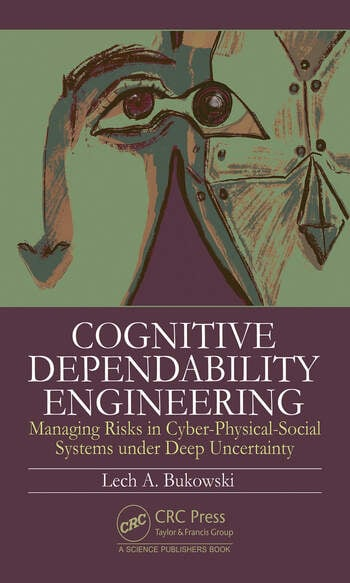
by Lech Bukowski
Abstract:
The work is a context-oriented analysis and synthesis of complex engineered systems to ensure continuous and safe operations under conditions of uncertainty. The book is divided in four parts, the first one comprises an overview of the systems engineering development; starting with basics of Systems Science and Single Systems Engineering, through System of Systems Engineering to Cognitive Systems Engineering. The Cognitive Systems Engineering model was based on the concept of imperfect knowledge acquisition and management.
The second part shows the evolutionary character of the dependability concept over the last fifty years. Beginning from simple models based on the classical probability theory, through the concepts of tolerating faults, as well as resilience engineering, we come to the assumptions of Cognitive Dependability Engineering (CDE), based on the concept of continuous smart operation, both under normal and abnormal conditions. The subject of the next part is analysis and synthesis of Cyber-Physical-Social (CPS) Systems. The methodology consists of the following steps: modeling CPS systems' structure, simulating their behavior in changing conditions and in situations of disruptions, and finally assessing the dependability of the entire system based on CDE.
The last part of the work answers the question of how to deal with risks in CPS systems in situations of high level of uncertainty. The concept of a Cognitive Digital Twin was introduced to support the process of solving complex problems by experts, and on this basis a framework for cognitive dependability based problem-solving in CPS Systems operating under deep uncertainty was developed. The possibilities and purposefulness of using this framework have been demonstrated with three practical examples of disasters that have happened in the past and have been thoroughly analyzed.
Table of Contents:
Preface.
Introduction.
PART I. DEVELOPMENT OF SYSTEMS ENGINEERING CONCEPTS: FROM SINGLE SYSTEMS ENGINEERING TO COGNITIVE SYSTEMS ENGINEERING. Basics of Systems Science. Systems Engineering. System of Systems Engineering. Cognitive Systems Engineering.
PART II. CONCEPTS OF ATTRIBUTE-ORIENTED SYSTEMS ENGINEERING: FROM RELIABILITY ENGINEERING TO COGNITIVE DEPENDABILITY ENGINEERING. Reliability Engineering: The Concept of Failure-free Operation. Safety Engineering: The Concept of Effective Protection. Security Engineering: The Concept of Cyber-security. Resilience Engineering: The Concept of Process Continuity. Dependable Computing: The Concept of Fault-tolerant Functioning. Cognitive Dependability Engineering: The concept of Trustworthy Performance.
PART III. MODELLING AND SIMULATION THE OPERATION OF CYBER-PHYSICAL-SOCIAL SYSTEMS IN A RISKY ENVIRONMENT. Methodology of Modelling and Simulation Used for Complex Systems. Modelling of Cyber-Physical-Social Systems. Simulation of Cyber-Physical-Social Systems Behaviour in a Risky Environment.
PART IV. MANAGING RISKS IN CYBER-PHYSICAL-SOCIAL SYSTEMS UNDER DEEP UNCERTAINTY. Uncertainty-oriented Concepts of Decision-making. Cognitive Dependability-based Problem-solving in Cyber-Physical-Social Systems Operating under Deep Uncertainty. Application Examples: Lesson Learned from Case Studies.
Summary and Concluding Considerations. Glossary. Index.
-

by Marcin Lis
Abstract:
The growing complexity, fluidity and instability of the environment as well as changing needs are challenges that both enterprises and higher education institutions must face. Higher education institutions understand that their key product, i.e. knowledge, is a value that can and should be offered to enterprises in a desirable form as a key to innovation and development as well as the basis of the necessary internal transformation to respond to requirements of our times. Attempts to explain the process of collaboration between higher education institutions and businesses based on an institutional perspective fail to capture the complexity of this process. The purpose of this book is to develop a model approach to managerial competencies that affect the innovativeness of enterprises and to identify internal and external key factors strengthening or limiting the impact of managerial competencies on the innovativeness of an enterprise including organizational structure, strategy, organizational culture and more. It will be of value to researchers, academics, and students in the fields of entrepreneurship, innovation, management, strategy, and will be particularly useful to organizations that are aware of their operating conditions in the knowledge-based economy and of the impact of the COVID-19 pandemics on the acceleration of the digital transformation of the contemporary world.
Table of Contents:
1. A Higher Education Institution as an Actor in Knowledge-based Economy Development Processes
2. Building Relations Between Higher Education Institutions and Enterprises – Literature Review
3. Digital Transformation as Space to Establish and Reinforce Relations Between Universities and Businesses
4. Digital Technologies in the Process of University-enterprise Relations Formation - Research Results
5. New Approach to Developing University and Business Relationships – Modelling
Conclusions
Publikacja została dofinansowana ze środków budżetu państwa w ramach programu Ministra Edukacji i Nauki pod nazwą „Doskonała nauka” – moduł: wsparcie monografii naukowych.
-

by Mateusz Grzesiak
Abstract:
Narcissists are seen as people who could inspire others due to their strong charisma, great vision, and ability to convince the crowd that they possess features that others don’t. They have followers and fans, and the ability to control them. On the other hand, narcissistic leaders express a lack of empathy and high levels of aggression and show constant criticism of others while refusing feedback on their performance. Those features indicate that such leaders have a strong sense of entitlement of superiority; therefore, it is hard to work with them. In the corporate world, many individuals with narcissistic personalities are chosen as leaders of organizations or teams, which often harms their co-workers and subordinates. Very few lower-level employees have a positive perception of their narcissistic leaders or are satisfied with their job, and so there is need to measure through qualitative research based on already existing articles in a given subject the correlation between the perception of narcissistic leader and the leader evaluation method.
This book gives insight into psychology and management by linking the narcissistic personality with the leadership role and with the method of evaluating a leader, along with discussing the positive or negative outcomes of their leadership. Readers will learn about the phenomenon of narcissistic individuals and leaders as well as the attributes and traits of such a person. This research monograph will be of interest to researchers, academics, and advanced students in the fields of work and organizational psychology and leadership studies.
Table of Contents:
1. Narcissism and Leadership: An Overview
2. Narcissisms in Leadership - It Essence and Classification: A Literature Review
3. The Narcissistic Leader: Perception, Evaluation and Research Methodology
4. Narcissistic Leaders within Organizations: Employee Evaluation versus Perception
5. Narcissistic Leadership and the Impact on the Leader-Follower Relationship
-

by Adrian Siadkowski, Łukasz Szymankiewicz, Karol Kujawa, Szymon Bańka
This guidebook presents a comprehensive overview of the project’s methodology, key findings and recommendations. It outlines the theoretical framework, practical case studies and actionable insights developed by the authors. Targeting academics, practitioners and policy-makers, the publication aims to facilitate knowledge exchange and support evidence-based decision making. With clear structure and accessible language, it serves as a valuable reference for anyone engaged in the field.
This project is funded by the European Union’s Internal Security Fund – Police. Grant Agreement No. 101034230 – ProSPeReS. Deliverable of WP3 – A.3.2.
-

by Zdzisława Dacko-Pikiewicz
Abstract:
Corporate reputation is important in gaining long-term competitive advantage and building company value. Thus, the author points out the need to manage reputation, which, due to its complex nature and multidimensional character, is a serious and difficult challenge.
The author develops a strategic model for family business reputation management. The book presents the review, systematization and synthesis of views on the notion of reputation and its role in building company value, the determinants of reputation; the identification of the characteristics and distinguishing factors of family businesses, areas of reputation building and resources involved in family business reputation building processes; and the description of determinants, components and processes in the field of corporate reputation management, and the identification of key links between them. It also identifies the key elements of the concept of family business reputation management and the relationship between them and practical recommendations for the use of reputation management concepts in improving the functioning of family businesses.
The developed model can undoubtedly be seen as a pioneering contribution to research into the competitiveness of enterprises. The book will therefore be useful to researchers, students and managers who are interested in decision-making in family businesses, entrepreneurship and small business management, and leadership studies.
Table of contents:
1. Reputation – importance to the modern organization
2. Areas which determine the reputation of family businesses
3. The concept of family business reputation management
4. Family business reputation management
5. Evaluation, conclusions and recommendations for family business reputation management
-

by Karolina Walancik
How has the legal context of the family changed in Poland? Families are by no means monolithic but heterogeneous. They are jagged and dynamic and globalisation has altered their form as well as the perception of family as a fundamental value in Poland over time.In this work the preferred family structures and models of family life by Poles will be explored, as well as the question of how values around family have shifted for Poles. The current legal regulations in Poland in the field of family law will also be debated to determine if they sufficiently support the goals and the function of a family.
-

by Olena Borysiak, Karolina Mucha-Kuś, Vasyl Brych, Grzegorz Kinelski
The monograph shows the level of ambition of climate goals set by the United Nations or the European Union. The authors also present the organizational and economic possibilities in terms of changes in the energy sector in Poland and Ukraine. Activities in the renewable energy segment alone, which are of a quantitative nature, may prove to be insufficient. Other modern systems and fuels must also be managed and developed. Governance in the energy sector should have a technological dimension in terms of activities and cooperation between market participants. The authors rightly note that with the progressive development of new technologies and the right strategy, the state is able to significantly improve the energy segment as a sector and increase its own energy security. Observing the complexity of the analyzed issues, an important element should be to adopt a broad perspective of the analysis.
-
by Katarzyna Szczepańska-Woszczyna
Abstract:
Competencies are a component of human capital and one of the most important assets of an enterprise. They play an important role in strengthening the position of the company in a competitive market. Investing in the development of competencies increases the organisation's ability to grow and compete through innovations. This book presents a multi-dimensional analysis of the relationship between managerial competencies and innovations. It analyses the role of a manager in a modern organisation, functions performed by managers, management styles and key challenges, including shaping behaviour in the process of managing change in an organisation, as well as an analysis of the structure of competencies, in particular managerial competencies, and the conditions of the process of forming managerial competencies.
Management Theory, Innovation and Organisation: A Model of Managerial Competencies illustrates the organisational conditions of innovativeness, which is the relationship between strategy, structure, organisational culture and leadership and knowledge management and innovation management. The developed model can undoubtedly be considered the author’s pioneering contribution to the studies of managerial competencies and innovativeness.
The book will be valuable to researchers, students, and managers in the fields of leadership, organizational studies, innovation management, and human resource management.
Table of Contents:
1. The manager in a traditional and modern organisation
2. Managerial competencies as a subject of research
3. Innovation and innovativeness. Determinants of the innovativeness of an organisation
4. Managerial competencies and their impact on the innovativeness of an enterprise
-
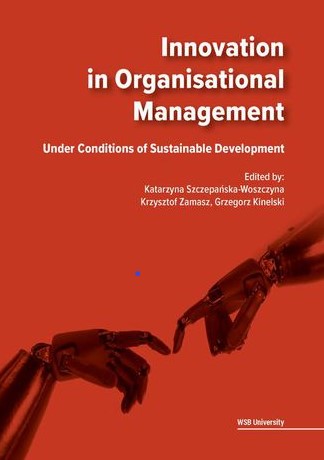
by Katarzyna Szczepańska-Woszczyna, Krzysztof Zamasz, Grzegorz Kinelski
-

by Zbigniew Makieła, Ryszard Borowiecki, Magdalena Stuss
Sustainability, Technology and Innovation 4.0 is a holistic perception and analysis of innovation at the level of public organisations, innovation in industry and innovation in HR. Its chapters collectively present a thesis that Innovation 4.0 signals a technological revolution that has the opportunity to prevent environmental degradation and, in particular, to stop climate warming, the effects of which may disrupt the process of sustainable development.
Uniquely, this edited book offers a comprehensive and multi-faceted examination of Innovation 4.0, fulfilling methodical, empirical and utilitarian goals. The methodological objective is to present tools that allow the identification, analysis and assessment of the relationship between Innovation 4.0 and inspiration that will carry society towards a new economic and social order. Its empirical aim is to enable the analysis and evaluation of the role of public organisations, innovation in industry and innovation in HR in the process of building sustainable development of the global environment. The book’s utilitarian goal is a recommendation for global organisations of Innovation 4.0 as an instrument to stimulate an innovative economy.
-

Publikacja zawiera analizę kluczowych czynników związanych z zachowaniami konsumentów, zarówno od strony teoretycznej, jak i praktycznej. Autorzy w dużej mierze koncentrują się na konsumencie XXI wieku – wykształconym i świadomym, ale też niecierpliwym, nielojalnym i kapryśnym. Monografia podzielona jest na trzy główne części: w pierwszej omówiono teoretyczne i prawne aspekty zachowań konsumentów, przeanalizowano rolę rządu w regulowaniu zachowań konsumentów oraz rolę Unii Europejskiej; w drugiej części przedstawiono strategie organizacyjne, takie jak wielokanałowa sprzedaż detaliczna i branding produktu; w trzeciej części opisano zachowania konsumentów w kontekście poszczególnych produktów i usług, od kawy po energię.
-
Autor: Marcin Lis, Jolanta Maroń
